The life and times of a Crazy Canuck who, after only 30 years of living in Canada, decides one day to move to Italy in 1989. Where he's been there ever since...
Wednesday, December 03, 2008
The calling of the tiny blue pill!
Worried that in the past her husband had had serious cardiac problems, the wife called the Carabinieri in order to calm he husband down. The agents found the man somewhat “infuriated” at the thought that someone could possibly interfere in his own personal (sexual) business. The man’s wife justified her call to the Carabinieri by saying that she was worried that so much passion could be fatal to her husband given his past heart problems. Only once the couple’s children arrived did the man finally come to his (sexual) senses, and the agents then left the couple’s home. What took place that night once the effects of the Viagra pill dissipated, remains to be seen.
Personally, I was once almost clobbered on the head by a pensioner and his umbrella in my neighbourhood postal office in Rome. I had been patiently lined up at the wicket when an old man entered. It was rather evident that he wanted to cut to the front of the line, at which point I gently tapped on his shoulder and made a gesture with my hand indicating that the end of the line was BEHIND me, and not in FRONT of me. The old man began raising his voice, threatening me with verbal abuse and waving in my face his umbrella, almost wanting to hit me with the object. Not only did I yell that there were almost 200 witnesses in the postal office if he indeed wanted to hit me with the umbrella, but as I exited the postal office, I yelled out in his direction (and in front of 200 people, including the staff): “You’re wife shouldn’t give you so much Viagra as it goes directly to your head”! Wicked indeed these Italian old timers.
Monday, November 17, 2008
Bring out your dead (again)!
According to the Guardia di Finanza (the Italian tax police), the financial damage to the Sicilian healthcare system amounts to “only” 14 million Euros. Italian journalists have therefore posed the following question: but if a family doctor doesn’t see his own patient for months or years, shouldn’t he/she do some type of follow-up? In normal cases (and countries) yes, but certainly not in Sicily.
One can see day in and day out that where there’s an (illegal) buck (or Euro) to be made in Italy, you can be sure that it can be made. Even by milking the dearly departed!
Thursday, October 30, 2008
Oh, what a lucky man (I was)!
Those first 12 years were obviously spent in elementary, junior high and eventually high school (in Winnipeg). That I still recall, not ONCE was there a strike in any of my schools, including university. Not ONCE did we protest in the streets of Winnipeg (or Kingston). Not ONCE were my teachers and professors absent (except naturally if they were sick, and that was rare too!). Not ONCE did I have to take my lessons outdoors (!!!). And not ONCE did I get whacked on the head by the city cops because I was protesting the government’s stand on Canadian education.
The story, as I’m presently writing, in Italy is QUITE different: as of October 30th, 2008, a massive general school strike (including teachers) is going on in Italy against school reform as proposed by the 35 year-old minister of education, Mariastella Gelmini, who is under Silvio Berlusconi’s right-wing government. So bad is the situation that even the October 18th issue of The Economist has reported on the sad state of Italian education (with a title which is play on words by an old Alice Cooper song, “Schools out”).
According to The Economist, Ms. Gelmini wants to “shake up” Italian education by introducing two education bills, which have naturally irked the (left-wing) opposition. As usual, the teachers’ union’s main complaint is a programme of cuts aimed at saving almost $11 billion (US). Ironically, in all this utter chaos surrounding Italian education something does shine in its educational system: international studies find that primary schools in Italy are the only part of Italy’s education that does well. Where Italy though seems to fail is in secondary education, according to international comparisons. According to one expert, the north of Italy is around the OECD average, but the south is on a par with Uruguay and Thailand.
Universities aren’t well off either. First of all, many fine young students, especially researchers, flee the country (in what many always call the “brain drain”) to foreign countries who not only offer more money for their research programmes but who are also void of a lot of nepotism and “ass-licking”: one faculty at the University of Bari was discovered with 9 members of the SAME faculty all working together (they naturally got in because they were all good). In many other cases, given the mighty power of the university “barons” (old-time professors who never retire and who wield incredible power), many young researchers who come up with a marvellous discovery in Italian university labs have to sign-off on their wonderful discoveries NOT with their names, but with the name of their lab directors.
The general situation in Italy is slowly declining. Just yesterday (Oct. 29th) in Rome at Piazza Navona, which is just a few metres away from the Italian senate, left-wing and right-wing students clashed with the usual guerrilla war-like scenes in Italy which are reminiscent of the 1968 period and also the (in)famous G8 Summit event in 2001 in Genoa (some scenes are also quite comical, as the two students and one parent who got dressed up as the Three Wise Kings and delivered to Ms. Gelmini a petition with 15,000 protest signatures!). And just last week in Milan, cops squared off against angry students who wanted to occupy a university building. My blurb on outdoor lessons? Again, the situation is quite comical because university professors, in a sign of protest, are holding throughout Italy many of their lessons outdoors, in town squares and streets (one lesson the other day was held right in front of Rome’s Palazzo Chigi, the seat of the government). The profs also bring along their blackboards, chalk, books, etc. The scenes are rather reminiscent of old Greek philosophers who used to teach outdoors, but in this era of modern-day buildings it is quite comical to see physics profs discussing Einstein’s theories as scooters, pigeons, buses, cars and pedestrians are whizzing by (not to mention foreign tourists who probably can’t quite figure what’s going on)!
My suspicion, unfortunately, is as soon as a rather nervous and trigger-happy cop is going to shoot off his gun (even by accident), not only will the usual “martyr” come out of the affair, but the old (or new) Red Brigades will once again raise their ugly heads and take advantage of the political and social turmoil (some experts believe that the R.B. have never totally disappeared as just a few years ago some political figures were assassinated by the so-called “new” R.B.).
The title of my posting this time? From an old Emerson, Lake and Palmer song (Lucky Man). The reason for it? Because I am SO lucky that I studied in Canada (and the UK) and NOT in Italy. I’ve sustained one thing in 19 years that I’ve been living in Italy that North American students are not necessarily MORE intelligent than Italians—some American students probably think that Seneca is a new Cuban baseball player with the NY Yankees!—but I will sustain one thing: that perhaps in North America, and in the UK, we’re much MORE prepared than Italian students because we don’t spend so much of our time striking and sitting in bars and cafés drinking coffee and beer (that was the scene I saw today as I was walking around the centre of Udine. Many students just took advantage of the strike as an excuse to not study).
An example? Some 25+ years ago, when I’d come home after a long day of lessons at the U. of Manitoba, I’d take a break, eat dinner and then in order to get some work done (in peace and quiet without having to hear the dogs barking or the tv), I’d hop into my car and go to the library of the U. of Winnipeg (which was also closer to my place). I’d get there at about 8 pm and I could (peacefully) study for up to 4 hours, without anyone bugging me. Let’s now fast-forward to 2008 (almost 2009 actually) and the University of Udine. I recently taught English to Phd students there. The lessons would go form 5:30 pm to 7:30 pm. Once the lessons were over, in order to exist the building, I’d have to wait for a student and his electronic pass in order to get out. As I’d exit the building, I would notice the opening/closing hours: 7 pm with the sign saying: “closed on Saturdays and Sundays”. I’d ask myself the following: “But if students can’t for one reason or another study at home, where do they go study”? The study facilities (from my own modest observations) in North America come second-to-none. Ditto for university sports facilities (the sports complex for example at the U. of M, in my time, was practically BIGGER than the entire town of Udine (pop. 95,000 souls). And as we all know, some of the world’s greatest athletes have come out of North American university sports facilities (one in particular? Michael Jordan from the U. of North Carolina. Ditto for Mia Hamm, once deemed the world’s most popular female soccer player).
Saturday, August 30, 2008
Primosten, Croatia August, 2008


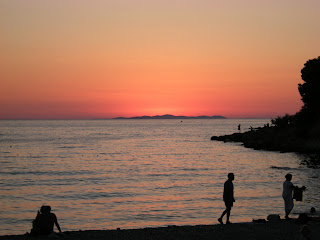
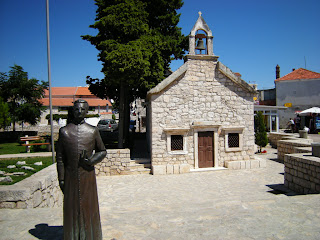
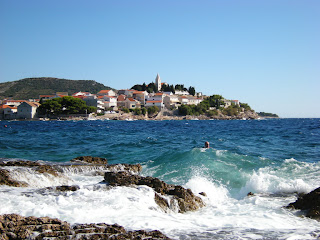


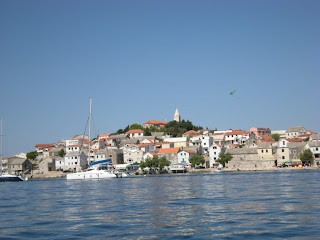



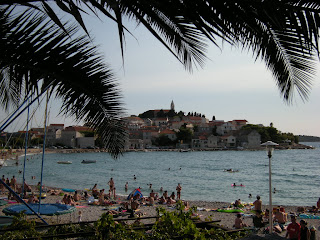
The food? Rather good, not too many restaurants mind you, but the ones that are there also serve good, fresh fish. Croatia at the moment isn’t in the European Union (nor in the Euro zone), so some currency conversion is the call of the day. We rented a small motor boat twice while we were there. A 2-hour boat ride ran us about 34 euros, including the gas 8and the young lady renting the boats the first time didn’t even charge us for the extra hour). The hotel (Zara) was rather nice with a GREAT buffet breakfast. The people? Very nice and hospitable I must say (with more than one that speaks an acceptable English) but the Internet connection was pretty bad. We also took a short drive to Split, a port town, but didn’t find it terribly nice (a lot of white high-rise buildings that were reminiscent of the former Yugoslavia).
The odd thing was thinking that some 10 years ago Croatia was involved in a terrible war with its neighbours. Funny to now see how things are “normal” in that part of the world with vacationers from all over the world taking in the sun and the water (all pics by M. Rimati).
Thursday, August 07, 2008
“Awe shucks, even Rodney Dangerfield gets more respect than me”!


As I tell many people, I’ve been reading The Economist now for more than 15 years (I also subscribe to what many call “The greatest magazine written in the English language”!). In all these years you could say I’ve seen a political analysis or two on world leaders, from Bin Laden (there was a recent survey on Al-Qaeda and B.L.) to George Bush Jr. to Tony Blair. I (can’t) even count on two fingers the times I’ve seen the magazine slam Canada’s prime ministers and/or political leaders on the front page, nor have I ever seen them poke fun of Canada’s leaders inside the mag, as The Economist has been doing with our “Great Leader”, Silvio Berlusconi. Is it perhaps that the Brits take Canada just somewhat MORE seriously than the Bel Paese? Naw…
Not the greatest publicity for Italy’s prime minister (nor for Italy and for those Italians who voted for him in the first place).
Wednesday, August 06, 2008
What’s next, the Keystone Cops, John Wayne or the Ghurkhas?
BBC World picked up on the news the other day (as I would imagine also other international television networks have done). The army personnel doesn’t per se have judicial powers, in the sense that they can’t really arrest anyone. That’s left up to the cops. What they can do is just assist the regular police authorities, by handing them over would-be criminals. And in Italy we’ve got a zillion different police units: the state police, the Carabinieri (the para-military police which is equal say to Canada’s RCMP), the city/town vigili (local cops), the Guardia di Finanza (the financial police), the Digos (police investigative unit) plus a myriad of secret services (both military and civilian).
The comical thing about all this is that with ALL the police forces in Italy (prior to the arrival of the army), one would think that the country was safe enough. But no. And quite honestly I’ve never been able to figure that one out yet as I personally (and my folks too) have been victims of crime in early 20 years in Italy, beginning with my Citroen car which was stolen some 15 years ago in Rome (it was probably hauled away by a tow-truck during the night) and then my brand new scooter (which was locked with only 3 chains and a kryptonite lock around a light pole in my apartment courtyard) which disappeared one fine night (the kryptonite lock by the way I found on the street the morning after, conveniently cut in half!).
In 30 years of Canadian life the only thing they ever stole from us was the car battery once from our Gran Torino, and in the summertime we tended to leave all our lawn furniture outside, not to mention the house doors which could be kicked in rather easily! And pickpockets? Never in 30 years in Canada did I ever see or even hear of one being arrested (and I also took the subway in Montréal quite regularly), a fry cry from the incredible number of pick pockets that can be found in one day alone in Rome’s subway (on the infamous no. 64 bus, the one that goes from Rome’s main train station to the Vatican, undercover cops once found on just ONE bus a record 10 pickpockets! The must have been naturally all going to some pick pocket convention…).
Regarding my car (a used one by the way!), we went to the nearby Carabinieri station to report the theft. There, the young officer was typing away my report when the wife naively asked, “But can’t you do anything about all these car thefts, I don’t know, like night rounds or something like that” (n.b. Rome has approximately 135 cars stolen---per day!)? The cop looked up from his old Olivetti typewriter as he was typing away slowly with just two fingers (he wasn’t even using a PC back then!) and said, “Look lady, years ago a young kid was caught shoplifting in a department store in Rome. The kid was the son of some powerful Italian politician. The cop who arrested him ended up in the boondocks on the island of Sardinian for three years” (meaning to say: “YOU want ME to actually do my duty when I may risk arresting the kid of a powerful politician, and then having MY career totally ruined”?)! As a taxpayer, this was naturally NOT the answer I wanted to hear. In fact, just around that period I shall never forget that in jolly ‘ol England, Jack Straw’s son (Straw was at the time Britain’s Foreign Minister) had been nabbed smoking a joint or two. British public opinion didn’t care much about Straw Jr. and his drugs but rather wanted the resignation of Straw Sr. (as though our fathers are ALWAYS responsible for what we kids do in life)! Talk about two completely different worlds…
And the initial results of the army personnel in the streets of cities like Milan and Rome? Well, a rather upset 17 year-old pickpocket was nabbed in one of Rome’s subway stops, by a soldier who handed him over to the cops. This new endeavour by our “Great Leader” will go on for about 6 months. Opposition members are naturally sceptical as this new security operation is costing the state several million euros, money which could be perhaps better spent in supplying regular police with newer cars (some are breaking down, even though recently the state police purchased “only” a shiny new Lamborghini in order to nab drivers on Italian highways. We’re naturally talking about a car which no doubt costs around 200,000 euros (if not more!) and which can “only” go at over 220 km/hr (in 2nd gear!). Not too much waste in public money there, no siree), or photocopiers or other mundane things which they lack because the state has practically run out of money!
Seeing that the other day Italian news has also warned vacationers that pickpockets are now targeting beach areas and sunbathers’ wallets and what not, I’m wondering if just off of Italian beaches we’ll also be seeing mini-submarines or AWACS flying overhead as people are tanning and swimming!
James Bond, where are you when we need you?
Thursday, July 17, 2008
Freddie Mac and Fannie Mae: and YOU thought YOU had financial problems?
Something a wee bit closer to home though I do understand, such as in the case of our lovely ladies “of the night”, that small army of hookers (or is it more politically correct to say “prostitutes”?) who are also beginning to feel the oil crunch at +150 dollars a barrel: in the Veneto region of Italy, located in the north-eastern part of the country (where Venice and Verona are to be found), about 200 foreign hookers in the area which goes from Mestre (located near Venice) and Treviso (home to the rich Benetton family) have noticed lately a slump in “sales”, given perhaps that many clients show up not on bikes or motorcycles but cars, and with gas in Italy at OVER 1.50 a litre, well, business has been rather slow with perhaps many clients preferring to stay home with their wives/ girlfriends or some quality porn DVDs.
The free-spirited ladies (void of any pimps by the way) have come up with an ingenious method of helping those poor clients who have been hit hard in their wallets by the current economic situation in Italy: “Buy four and pay for three”! Yes, what the ladies have done is prepared tiny hearts made of red cloth with their names written on them. Every time a client uses a hooker’s service, he’s awarded a red heart. Once he’s reached 3 hearts, the 4th encounter is “on the house”! Yes, even the world’s oldest profession is facing the economic crisis!
Clients are especially overjoyed at this new entrepreneurial endeavour and the hookers themselves don’t seem to mind as business is “up and rising” (excuse the pun!) once again. Those who aren’t so happy are the folks who live in the areas that are frequented by clients and hookers: their initial protests to have the hookers moved away from residential neighbourhoods where they pose a nuisance was initially effective, until the red hearts popped into the equation.
The Marghera area (where the major industrial companies are located just near Venice) have come up with something slightly different, much to the chagrin of police authorities: there, pimps have imposed on their ladies discounts for clients: instead of 50 Euros for the “works” hookers are now allowed to charge their clients 45 Euros with that 5 Euro discount making all the difference, especially in run-down areas.
Given that red is traditionally THE colour of Christmas, I wonder what hookers will come up with for the upcoming winter season (seeing that environmental conservation is now on everyone’s mind lately): one free plastic Christmas tree with every sexual encounter?
Friday, June 27, 2008
The invasion of the “Portuguese”!
Why then the word connected to the Iberian nation? It stems from an event which happened in Rome in the 18th century. The Portuguese embassy had invited all its citizens to a show at the Argentina theatre located in the centre of the Eternally Chaotic City. The embassy had decided to invite all its loyal subjects, but without the need of a special invitation. All one had to do was to declare one’s Portuguese citizenship in order to gain admittance. Not wanting to pass up something for free (who does actually?), many Roman citizens went to the event pretending to be Portuguese, when in reality they obviously weren’t. And so the “label” has stuck ever since.
According to a very recent Italian transportation survey, there’s quite a variety of travellers who don’t pay their travel tickets (indeed very humane the Italians: they stopped travellers in order to do give out a travel questionnaire. Those who were in fact caught without a ticket but volunteered to take part in the survey were not fined!): students, employees, homemakers and the unemployed are included in the list. Statistics show that the hole left by unpaid tickets amounts to “only” 450 million Euros per year, enough to buy 900 new buses—per month!
Eleven percent of women don’t pay whereas the men amount to 21% of the culprits. And once the fines are finally dished out, only 1 out of 3 fines are in fact paid. Transport authorities are now thinking of adding stewards on buses and in the subways, sort of like what is now going on in Italy’s soccer stadia (an idea copied from the Brits). That’s an awfully smashing and wonderful idea, but wouldn’t it make more sense to have buses WITHOUT three doors, and proper turnstiles in the subways of Rome for example?
Just recently Rome installed electronic reading turnstiles in its subway, the ones that for years have been used in more “advanced” countries. The buses: there are usually 3 doors to a bus, the 1 in front for getting on and the middle and the 1 at the back for getting off. Naturally, in such a chaotic city such as Rome where the average Roman (and not only him/her) can’t follow the simplest of rules, everyone gets on/off in ALL the doors. Add to this that unlike the buses I used to take living in Canada (only 2 doors, 1 in the front and 1 in the middle), the drivers don’t accept money or tickets and don’t at all bother to check your monthly pass. What the buses do have is a cancellation machine, usually two to a bus (and in many cases, they don’t even work!). What that less-than law-abiding citizen must do is to “obliterate” his/her ticket in order to validate it. It’s basically based on the honour system (which in a country such as Italy is in itself a contradiction in terminology!).
I never ONCE recall a bus inspector in my hometown of Winnipeg (when I was a kid going to school), just because there was a little contraption as you got on (located right next to the driver’s seat) where you either put in the correct fare or your bus tickets. You didn’t’ pay? You didn’t get on the bus, it was that simple (and you can be SURE that there was NO hope in hell of convincing the driver of letting you on either!). The middle door was ONLY used for getting off and NOT to get on the bus. And if you tried, the bus driver would simply tell you to either p.off or to use the front door!
Ditto for the subway (which I used to take in my 3 years spent in Montréal). You either had to show your monthly pass to the fellow in the glass booth (who was DOING is job well) or you had to pay for a ticket or to put your daily ticket in a special device. Or with your monthly pass you’d put it in the electronic turnstile. If it was obviously valid, the glass doors would open. If it wasn’t, the doors wouldn’t open and the man would give you a strange look (meaning to say, “So, you’re NOT going to try to jump over the turnstile, are you”?). We’re talking about the late 80s by the way.
Now some fun stories about taking the subway in Rome: pre-2000 (just in time for the Holy Jubilee in the year 2000 the local subway transportation hired a bunch of young kids for the added influx of pilgrims who flocked to Rome. Many turned out to be the kids of long-time employees who retired earlier in order to leave their jobs to their kids). One day, during the morning rush-hour (8ish or so), as I approached the tiny man in his airless glass booth, I noticed that he was rather pensive and with a pencil in his hand. He was sort of looking out into outer space, totally oblivious to the zillions of passengers who were whizzing by him to go to work (most of them could have been gorgeous naked women and he wouldn’t have flinched in inch!). As I got closer and being rather tall, I peered down to see what he was doing (perhaps he was filling out an important related to his job?). No siree, he was trying to guess the results of the upcoming soccer matches for the state-run soccer lottery known as Totocalcio! On another occasion, around 8ish during the week, a colleague of the soccer aficionado was simply sleeping in his booth (and as I walked by I yelled out in English: “Wakey wakey”!!. He opened his eyes half-groggy and rather p.offed too that someone had DARED disturb his morning siesta!). And on other occasions during rush-hour, the booths were totally empty with employees either out for coffee or a very long and extended pee! It’s no wonder that city transportation companies have throughout the years lost an enormous amount of money with such HIGHLY inefficient personnel!
But wait, the best has yet to come: the Rome soccer derby between Roma and Lazio! On more than one occasion I’ve taken the subway around 8:30 pm and NOT paid the ticket, simply because you can be nearly 100% sure that subway employees and the inspectors that are (at times) at the bottom of the stairs making sure you’ve paid your ticket, are either Roma or Lazio fans, and they’re either at the Olympic stadium taking in the match or at home watching it live on Sky tv! In fact, the subway that night is virtually empty (even more if Italy is playing in a World Cup event).
I said it nearly 19 years ago and I still say it today: in Rome’s case, both the buses and the subways are simply “strainers” that lose on a yearly basis zillions of Euros. Some people have accused me of being dishonest and of being like the Romans themselves (well, after all, there is a famous saying isn’t there, “When in Rome….”?). I almost say proudly that “Yes, I too am dishonest, but only because the system ALLOWS me to be dishonest”! I wasn’t perhaps particularly crazy to pay for the bus/subway in Canada, but I had no choice in the matter as the system didn’t permit me to be dishonest (in the nearly 19 years of Italian life, I’ve NEVER said that Canada is populated by saints. It’s just that Canadian society doesn’t allow you to get away with a zillion things as you can in Italy).
So yes, from now on, do call me then that “Crazy Italo-Canadian-Portuguese”!
PS In all this “Portuguese” matter, it doesn’t help much that according to the most recent Transparency International European corruption index, Italy comes in at position 22, right after the Czech Republic and just ahead of the Slovak Republic. The least corrupt nation in Europe? Denmark (the most corrupt one is Romania)!
Sunday, June 08, 2008
Talk about following the rules!

Tuesday, May 06, 2008
From a buffoon to a genius?

The title is taken from an old Abba song and personally speaking, isn’t THE most respectable title one can give to a political leader. And the pic of Silvio isn’t exactly one of the nicest around either. In fact, it makes him look like a clown, or better, a buffoon. While Italy has to a certain degree fallen in shambles (the Alitalia affair which no one seems to want and is losing zillions of euros, the on-going and nauseating garbage issue in Naples which seems to have no end in sight and which can only get worse with the warmer weather, and other “funner” things which seem to pop up on a daily basis in Italy), the Economist comes out with a wee bit of refreshing news with their April 26th issue: it has spoken VERY highly of Sergio Marchionne, the managing director of Italy’s largest company, Fiat. The title of the four-page article on Fiat is: “The miracle of Turin”.
Here’s a few things that the magazine has said about the apparently easy-going Marchionne (he rarely dons a tie and jacket for example at press conferences or at international car fairs):
“By the time Sergio Marchionne came along in 2004, most of the beauty had gone and the stiffness had become sclerotic. Born in Italy but educated in Canada and schooled in business outside the car industry, Mr. Marchionne combined an insider’s sense of how the system worked with an outsider’s vision of how badly it needed to change”.
A bit of Canada in Fiat’s success? Perhaps yes seeing that Marchionne’s first university degree was in law from Toronto’s prestigious Osgoode Hall and his second degree was an MBA, again from Ontario. He was born in the town of Chieti and moved to Canada when he was young. No doubt his Canadian upbringing and education has been a “jolt” to the Italian industrial sector which, according to Italian journalists, is in desperate need of a change vis-à-vis its current managers.
Just how different Marchionne’s style is can again be seen in the words of the Economist:
“He is the antithesis of the archetypal smooth Italian executive, in part that may be because Mr. Marchionne, though Italian-born, grew up in Canada, where he qualified as both a lawyer and an accountant. His approach to business is decidedly Anglo-Saxon, as is his frequent use of expletives. He demands complete openness, fast communication, accountability; he abhors corporate politics and hierarchy”.
These last two Italian “symptoms” are what quite often slow down Italy’s progress on a national scale, as I’ve personally witnessed in nearly 19 years of Italian life (the public sector, at least in Rome, is one to avoid like the bubonic plague!!!).
There is now in Italy a new debate on immigration given the fact that in Rome for example there’s a new right-wing mayor and the new Italian government also has in its coalition a rather large xenophobic contingent made up of Northern League members, apparently the most prominent in all of Europe. Most of the talk always and inevitably regards immigration in a negative light (such as the Romanian community that commits rapes or murders). Rarely though does anyone speak of the valid contribution that some “immigrants” such as Marchionne (albeit he was in fact born in Italy) can give to Italy itself. No siree, the immigration debate in Italy is still seen in a negative manner. Indeed a pity as exceptionally qualified people like Marchionne could actually do Italy a LOT of good and actually make it part of the First World (and NOT the Third World)!
Tuesday, April 29, 2008
Hey buddy, know where I can catch a plane?
With the disastrous Alitalia financial situation (the quasi belly-up national airline company which was once one of the best in Europe) which has made the companyt lose a whopping 4 billion euros in the last few years, or roughly 3 million euros per day, the airport situation in Italy, along with the garbage in Naples, ain’t one of the best in Europe! Upon entering the new government, Silvio Berlusconi has asked his predecessor, Romano Prodi, for 300 million euros in order to still keep the company in the air until someone comes along to save it (Air France/KLM and Aeroflot have pulled out of the deal, no doubt due to strong pressure from the powerful trade unions). The astounding thing is that the money should be returned by December 31st of this year (yeah, sure)!
More red-tape-Italian-style bureaucracy can be found in Rome’s second major airport, Ciampino (which is also used by the Italian air force). Ciampino, unlike Fiumicino, is used primarily by low-cost carriers, such as Ryanair. The advantage of Ciampino is that it’s located closer to downtown Rome, and this is very convenient to the Irish airline company, but unfortunately is also located basically in a residential area. This means that flights that should arrive at say 11.30 pm can eventually arrive even at 2 in the morning due to delays. The positive thing for Ciampino is that passengers are up now to 5 million per year. The negative thing is for the health and sanity of residents, they want the airport moved. But where? Some have come up with the idea of Viterbo, the so-called town of the “popes”, located just 100 km from the Eternal City. Ryanair wants no part of that deal and threatens to sue the Italians. The problem with Viterbo is that the runway would have to be extended by approximately 1 km in order to accommodate large aircraft and trains are rather antiquated and bulging with daily commuters to Rome. Some experts suspect that the airport will no doubt be completed…in about 10 years’ time!
Sunday, April 06, 2008
Help, is there a “dottore” in the house?
And as we all know living in North America or in the UK, only if you have your Phd. can you be called a “doctor”, or if naturally you’re a medical doctor. But just how many Italian university graduates are truly full-blooded “dottori”? I ask because there have been several cases of students buying their degrees, or of cases where they’re not even “dottori”, but expect you to call them by their (illegal) title. This happens more in southern Italy. Or in many cases, students either cheat like hell (I had the pleasure years ago of having taught English in Rome’s “European Economic School”. We gave out an exam. Well, the exam had to be re-done because there was not ONE single student who HADN’T cheated on the final exam. Not one! It also goes to show you why the average Italian speaks English sooooo terribly too) or buy their exam results.
This recently happened at the University of Bari, located in southern Italy, a university notorious for also having in just one faculty nine members all from the SAME family (gosh, they must have obtained their teaching positions because they’re good, eh?). Math results in the Faculty of Commerce & Economics were sold to students, many of them foreigners, by two professors and their assistants. Some of the fees went from 700 to a whopping 3,000 euros. Some students were even “coerced” into attending private lessons for “only” 3,500 euros! The culprits were nabbed, but seeing that we’re in Italy, I doubt many things will change…
Yours truly only studied 8 years in two different universities in Canada. I admit that at high school, a true dunce in maths and physics, I’d (occasionally) copy exams from my brainer classmates, but quite honestly, not ONCE did I dare copy at university, for the simple reason that I would have blown the entire academic year, and with that also the money that my poor folks had dished out for so many years for my BA and subsequent Master’s degree. And in those 8 years I can perhaps count on one hand (and on just a few fingers) the students that we’d hear about that got straight As in ALL their courses. You had to be some type of nerd who never frequented people and who basically just studied all day and night to get those grades. Ah, but not so in Italy where the “110 lode”, the toppest of all grades awarded to university students, is handed out with a certain amount of ease. In North America, you had to be MORE intelligent than both Bill Gates AND Henry Kissinger put together in order to get the equivalent of the 110 lode.
That brings me to a perplexing question: if Italy is populated by sooooo many geniuses, how come it’s run sooooo badly (ie, just look at the disastrous situation vis-à-vis the economic situation with Italy’s national airline company, Alitalia)? It’s not perhaps that the odd manager out there, a “dottore”, actually bought his degree somewhere, perhaps in Bari? Naw….
Friday, March 07, 2008
Kill the ref (literally!)
Italy’s Pierluigi Collina, deemed after the 2002 World Cup THE best ref in the world, is now the head of the Italian ref’s association. Well, for the last few months the poor sod has been going around with a police escort as crazies out there have sent him via the mail bullets as a “warning” that his refs aren’t doing their job properly (and no doubt many of these crazies are probably Juventus fans). Not only that, but just the other day, the ref of a Juventus-Naples match was kidnapped by irate fans. Well, almost. I say almost because the “Keystone Copish” fellows who went to kidnap him ended up kidnapping his look-alike and NOT the real McCoy (someone who was very similar to the real ref)! Once they noticed the mistake they made the poor look-alike was immediately released.
But the nightmare hasn’t ended there for the real objective in question. No siree. The real quasi-kidnapped ref for two weeks has had to leave his hometown of Genoa and has gone in seclusion for fear of REALLY being kidnapped!
A ref’s association member, which counts only 32,000 referees in Italy (including the minor leagues where quite often refs are beaten up by rowdy fans), stated today that things will certainly worsen if something is not done about the violence against refs. The situation of Italian sports shows (99% of them talk exclusively about soccer) doesn’t help matters much either: unlike rugby, many of these shows literally will bring viewers to the exasperation point as they’ll repeatedly show and analyse the same foul or off-side a zillion times. I say, “Why the hell not just concentrate on the bloody match itself rather than talking endlessly if Del Piero was tripped in the pk area or not”?
But alas, as with politics, Italians absolutely adore talking and talking and talking endlessly about their favourite national pastime, soccer. The result is that the Italian state (ie, all us taxpayers) now have to ALSO pay cops in order to defend refs (as though we don’t pay enough each weekend for stadium security!). Somewhat ridiculous, I must say (not that Italy doesn’t have MORE serious problems to contend with, like the mafia).
Wednesday, February 27, 2008
Pedestrian crosswalk, so what’s that?
The latest stats say that out of the 60 pedestrians that are injured DAILY in Italy as they cross the street, 2 die. That’s quite the percentage of deaths. But in 2008 we all know (at least those who live in Italy like yours truly) that Italians STILL don’t know what pedestrian crosswalks are or for what they’re intended for. In the small and quiet town of Udine, few Italian drivers will stop to let pedestrians cross the street. Quite the opposite of what I witnessed in Munich in 2004, my first-ever visit to the splendid country of Germany: 90% of German motorists would stop as I would go to cross the intersection. And what to say about the dirty looks you got from Munich bikers if you accidentally walked on their bike paths! Drivers in most “civilised” countries, like the UK, will act exactly in the same way as Munich drivers.
Jay-walking infractions in Italy? “Now what’s that”? will the average Italian ask you (in 1999 as I was Italy’s interpreter at the splendid Women’s World Cup held in the US, we were in Santa Monica one night playing pool in a bar. As we headed back to the car to go back to LA, I decided to cross in the middle of the street to head for the car park. My LA chaperon stopped me and said, “You have to cross at the lights otherwise the cops will fine you for jay-walking”! I laughed as my immediate thought went to the zillion of jay-walkers in Naples!!!).
I still recall one golden rule that teachers would tell us while going to school as a kid in Canada: “Remember children, look BOTH ways when crossing the street”! They would also teach us that when sidewalks were missing we should walk FACING traffic, another golden rule which is often lacking in Italy.
With such catastrophic accidents on a weekly basis in Italy, involving both drivers and pedestrians, I often ask myself: “But what on earth do they (or don’t they) teach in Italian schools”?
Tuesday, January 29, 2008
“You’re a piece of sh…”!
But what happened in the Italian senate was not only appalling but I must say, also typically “Italian”: pure chaos. When the president of the senate came out with the final tally which thus drove the nail into Prodi’s coffin, one senator (who was a former hoodlum in his youth!), a fellow by the name of Gramazio, uncorked a bottle of spumante while a colleague below him, whipped out, presumably out of his pocket, slices of mortadella (or Bologna ham as it’s also known in North America)! The mortadella was in clear reference to Prodi himself whose round face is often compared to the delicious ham.
But that wasn’t the end of it. The same senator who gulped down the mortadella began yelling repeatedly to an opponent senator: “You’re a piece of shit”! This was naturally picked up immediately by the foreign press. More was to come though: another senator spat at his opponent (who suddenly fell over ill) and showed him the classic hand gesture in Italian of someone who’s wife has screwed around on him (the gesture is the same that Americans in Texas use at football games—the Texas longhorns--or that deaf-mute people use to say “I love you”. The gesture in Italian means instead that you’re a “cornuto”! The senate cornuto gesture brings back memories of what happened many years ago in Rome when George and Barbara Bush came on an official visit when Sr. was US president. Barbara had gone to a Roman orphanage. She looked at the kids and said, “Do any of you speak English”? No was the reply from the kids. Barbara then asked, “Well, do any of you speak Spanish”? Again no was the answer. All of a sudden, Barbara showed all the kids the “cornuto” sign, saying: “Well, do you all know what this means? It means “I love you” in deaf-mute language”! her entourage from the embassy were naturally aghast when she showed the kids the “cornuto” sign! That night, the two were invited to the presidential palace in Rome for the official dinner. For the life of him, George Sr. couldn’t quite understand why along the presidential route Italians were showing him the “cornuto” gesture!).
All this, coupled with the atrocious and exceptionally embarrassing situation of the garbage problem in Naples which has been going on for the last 14 years (together also with the recent resignation of Italy’s justice minister over a classic case of Italian-style nepotism), helped (unfortunately) once again to put Italy on the same map as some Third World countries…
Sunday, January 06, 2008
New Year’s in Prague!

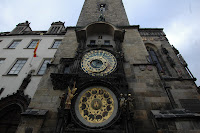


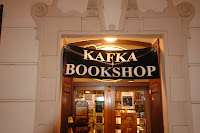




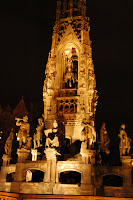






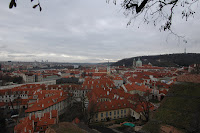
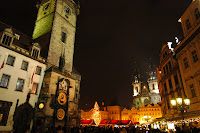
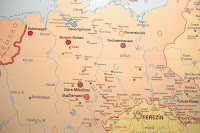






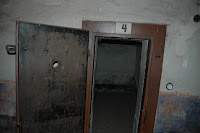



We chose a night train from Udine, a rather long journey I must say but at an affordable price: 120 euros return. We left at 11 pm on Saturday night and arrived in Prague at noon the following day (the return instead was at 5 pm with arrival in Udine at 6 am). We went just for four days. Luckily, we took a couchette and there were only four of us. I kept thinking during the trip to Prague and as we rode through parts of Austria of more than 60 years ago and how thousands of people, with not much choice in the matter, were hauled in cattle wagons to concentration camps (including my uncle). That must have been simply atrocious as the wagons were jam packed and with only a hole in the floor for washroom purposes. Our train this time was decidedly MUCH more comfortable!
I thought Prague was indeed a most elegant town, home to some rather interesting architecture as well as some well-known personalities who were actually born there and/or who lived there, such a former U.S. Secretary of State Madeleine Albright and novelist Franz Kafka (he had lived in a small house in the city’s castle). Beethoven also lived there. The country has also given birth to film director Milos Forman and Juventus soccer player Pavel Nedved, not to mention the country’s former president and author, Vaclav Havel, who lived through Czechoslovakia’s “Velvet Revolution” and was the Czech Republic’s president from 1993 until 2003 (the Rolling Stones played there just after the Berlin wall came down in 1989. Some thirteen years later they were again in Prague, and both times they had been greeted by a jubilant Havel).
The castle is quite nice as is the famous Charles bridge (albeit some of the statues would need some urgent cleaning!). And the beer? They say that Czechs are the world’s largest consumers of beer in the world. It is indeed mighty fine to drink a wide variety of the stuff. We noticed many Italians there, especially kids, who no doubt travelled to Prague for the great beer and the party atmosphere. The city itself doesn’t come across as being chaotic in nature, like Rome, probably because it has a smaller population and because it also has three functioning subway lines (like Munich’s subway, Prague’s subway trains are almost spotlessly clean, a far cry from Rome’s decrepit trains!). There was also a quasi-absence of scooters too which made walking around the town rather pleasant and relaxing. The eve countdown was spent near the Charles bridge.
A lot of history in the city/country as the poor Czechs not only lived under the brutal regime of the Nazis from 1939 to 1945 but again went through the communist regime years later (this year by the way, in August, marks the 40th anniversary of when Warsaw Pact armies marched into Prague under Alexander Dubcek’s reign. More than 100 Czechs were killed, including Jan Palach, who in 1969 lit himself on fire in a sign of protest). Perhaps the most difficult period was under the head of the Gestapo, Reinhard Heydrich, affectionately called the “Butcher of Prague”! He had been the protector of Prague for only 8 months until he was assassinated in downtown Prague by Czech partisans. When news of his death reached Hitler, the Furher apparently unleashed hell upon Czechoslovakia!
For a (strange) lover of concentration camps, Prague had also been a treat for me as about 80 kms north of Prague lies the concentration camp of Terezin (the name is in honour of the former empress Maria Teresa. Its German name is Theresienstadt). It’s an old fortress which had been actually designed by an Italian architect in the 18th century as a fortification during the Prussian period. The Nazis then established their concentration camp there (it would become the Gestapo’s Prague prison).
Prisoners from Poland, the USSR, Germany and Yugoslavia were incarcerated there, as were Jewish prisoners who were treated rather brutally. Over 10,000 victims died there, many were cremated in the crematorium in the town of Terezin, located a few hundred metres from the fortress (there’s also a ghetto museum there which contains the crematoriums). Some 15,000 children went through that camp with only about 130 who survived. The saying “Arbeit Macht Frei” which is so famous the world over and which is seen always hanging over the entrance to Auschwitz is also present at Terezin (see picture). The phrase was imported to other camps such as Terezin from Dachau. There’s also a gallows pole and a firing range next to it where up to 600 shot. The prison cells could contain up to 60 prisoners at a time, in obvious appalling sanitary conditions.
Poetic justice: as in the case of Auschwitz’s commander, Rudolf Hoss (who had worked for 6 years at Dachau and who had been handpicked by Himmler to run Auschwitz), Terezin’s commander, Heinrich Jockel, who had commanded the brutal SS wardens there, was tried and executed at the very same place he had run—Terezin. Another “illustrious” prisoner at Terezin was a fellow by the name of Gavrilo Princip. Princip was the main protagonist of the Saravejo assassination of Francesco Fernando d’Este (his death had basically sparked WWI!). He was imprisoned and died at Terezin in 1918 (his cell is still there with a commemorative plaque from the Yugoslav government recalling his “heroic” act). This was my 7th concentration camp visit after Dachau, Buchenwald, Mauthausen, the Risiera of San Sabba in Trieste and Auschwitz-Birkenau (some of these camps I’ve so far seen twice).
From the picture I took of the map of concentration camps in Europe, if you look below and left of Berlin and north of Buchenwald, you’ll see a town called Halberstadt. That’s where my young uncle Mario, an Italian partisan, had died in the POW camp there. The day that I’ll go to Berlin I’ll probably pay a visit there too (after Bergen-Belsen and the other adjacent camps). You can also see below and on the right the camp of Terezin (all pics by M. Rimati).